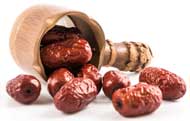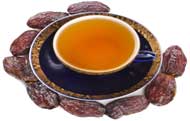





1. Date Facts
2. Types of Dates
3. Nutritional Value of Dates
4. Health Benefits of Dates
Phoenix dactylifera, commonly known as the date palm, is a flowering-plant species in the palm family Arecaceae, cultivated for its edible sweet fruit called dates. The species is widely cultivated across northern Africa, the Middle East, the Horn of Africa, Australia, South Asia, and the desert regions of Southern California in the United States. It is naturalized in many tropical and subtropical regions worldwide. P. dactylifera is the type species of genus Phoenix, which contains 12–19 species of wild date palms.
Date palms reach up to 60–110 feet in height, growing singly or forming a clump with several stems from a single root system. Slow growing, they can reach over 100 years of age when maintained properly. Date fruits (dates) are oval-cylindrical, 3 to 7 centimetres (1 to 3 inches) long, and about 2.5 cm (1 in) in diameter, with colour ranging from dark brown to bright red or yellow, depending on variety. Containing 63-64% sugar by mass when dried (nutrition table), dates are consumed as sweet snacks on their own or with confections.
History and Origin
Dates were first cultivated between 7,000 and 6,000 years ago in ancient Mesopotamia (modern-day Iraq) or the Upper Arabian Gulf, with evidence of cultivation also found in western Pakistan and eastern Arabia around the same time. Their exact origin is uncertain due to extensive cultivation and trade throughout antiquity, but it's clear the date palm has been a vital staple in the Middle East and North Africa for thousands of years.
- • Medjool
- • Barhee
- • Deglet Noor
- • Zahidi
- • Khadrawi
- • Thoory
- • Bou Fergus
- • Bou Skry
- • Boustrami
- • Khalas
Common types of dates grown and sold in Australia include Medjool, Barhee, Deglet Noor, Zahidi, and Khadrawi. Many other varieties are also grown commercially, with a strong focus on both the most popular types for their flavour and texture, such as Medjool's caramel notes, and others for different uses.
Variety types
Medjool: Large, sweet, and soft with a caramel-like flavour, often called the "king of dates".
Barhee: A very sweet, soft, and crisp variety, which is often picked and eaten while in the "khalal" (yellow) stage.
Deglet Noor: A firmer, amber-coloured date, often semi-dried and used for cooking and other products.
Zahidi: A dry, firm, and sweet date, often used for baking or as a snack.
Khadrawi: A soft, very sweet date with a molasses-like flavour, great for eating fresh or cooking.
Thoory: A firm, chewy date that is chewy and has a nutty flavour.
Bou Fergus: A soft, sweet date that is very versatile.
Bou Skry: A small, soft date with a strong, rich flavour.
Boustrami: Small, almost black dates with a dense, fruity flavour.
Khalas: A soft, caramel-flavoured date, often eaten fresh or dried.
Other varieties
Amir Hajj, Anbarah, Anatlus, Ashal al Hassa, and Ashrasi are also grown and are part of trials in Australia.
Dayri, Fard Female, Green Ghanami, and Halawy are among the many other varieties being grown and researched in Australia.
Fruit ” Dates ” ( Nutritional value )
Nutritional value per 100 g
Dates, deglet noor
|
Nutrient ( Proximate’s )
|
Unit
|
Value
|
Daily Value %
|
|
Energy
|
kcal
|
282
|
14.1%
|
|
Protein
|
g
|
2.45
|
4.9%
|
|
Total lipid (fat)
|
g
|
0.39
|
0.5%
|
|
Carbohydrate, by difference
|
g
|
75.03
|
27.2%
|
|
Fiber, total dietary
|
g
|
8.0
|
28.5%
|
|
Sugars, total
|
g
|
63.35
|
|
|
Minerals
|
|||
|
Calcium, Ca
|
mg
|
39
|
3%
|
|
Iron, Fe
|
mg
|
1.02
|
5.6%
|
|
Magnesium, Mg
|
mg
|
43
|
10.2%
|
|
Phosphorus, P
|
mg
|
62
|
4.9%
|
|
Potassium, K
|
mg
|
656
|
13.9%
|
|
Sodium, Na
|
mg
|
2
|
0.08%
|
|
Zinc, Zn
|
mg
|
0.29
|
2.6%
|
|
Copper, Cu
|
mg
|
0.206
|
22.8%
|
|
Manganese, Mn
|
mg
|
0.262
|
11.3%
|
|
Selenium, Se
|
mcg
|
3.0
|
5.4%
|
|
Vitamins
|
|||
|
Vitamin C, total ascorbic acid
|
mg
|
0.4
|
0.4%
|
|
Thiamin (B-1)
|
mg
|
0.052
|
4.3%
|
|
Riboflavin (B-2)
|
mg
|
0.066
|
5.0%
|
|
Niacin (B-3)
|
mg
|
1.274
|
7.9%
|
|
Pantothenic acid (B-5)
|
mg
|
0.589
|
11.7%
|
|
Vitamin B-6
|
mg
|
0.165
|
9.7%
|
|
Vitamin B-12
|
mg
|
0.00
|
|
|
Folate DFE (dietary folate) (B-9)
|
mcg
|
19
|
4.7%
|
|
Vitamin A, RAE (retinol)
|
mcg
|
0
|
0
|
|
Vitamin E (alpha-tocopherol)
|
mg
|
0.05
|
0.3%
|
|
Vitamin D (D2 + D3)
|
mcg
|
0
|
|
|
Vitamin K (phylloquinone)
|
mcg
|
2.7
|
2.2%
|
|
Lipids
|
|||
|
Saturated Fatty Acids
|
g
|
0.032
|
0.1%
|
|
Monounsaturated Fatty Acids
|
g
|
0.036
|
|
|
Polyunsaturated Fatty Acids
|
g
|
0.019
|
|
|
Trans Fatty Acids
|
g
|
0.000
|
|
|
Carotenoids
|
|||
|
Beta-Carotene
|
mcg
|
6
|
|
|
Lutein + zeaxanthin
|
mcg
|
75
|
|

|
Reference Values are based on a 2,000 Calorie Intake, for Adults and Children 4 or More Years of Age. Your daily values may be higher or lower depending on your calorie needs.
|
|
Percentages are roughly approximated using (RDA) Recommended Dietary Allowances for adults. Source: USDA United States Department of Agriculture
|
|
Reference Values for Nutrition – FDA U.S. Food and Drug Administration
|
Dates Nutritional Value
Dates provide numerous health benefits, including improved digestion, better heart health, and enhanced brain function, thanks to their high fiber, antioxidant, and mineral content. They are rich in fiber, potassium, magnesium, and various polyphenols, which help regulate blood sugar, support bone density, and protect against chronic diseases.
- IMPROVE BRAIN FUNCTION
Dates may support brain function by reducing inflammation and oxidative stress due to their antioxidant content, which could help lower the risk of neurodegenerative diseases like Alzheimer's. Animal studies show dates can improve memory, learning, and anxiety-related behaviours. While promising, more human research is needed to confirm these effects. - FERTILITY
Dates are considered beneficial for fertility due to their rich nutritional content, which includes antioxidants, vitamins (like B6), and minerals (like iron and magnesium) that can support both male and female reproductive health. They may help improve sperm quality and motility in men and support hormonal balance and egg quality in women. - BLOOD SUGAR CONTROL
Dates can be included in a diabetes-friendly diet for blood sugar control due to their low glycaemic index, high fiber, and other nutrients, but moderation is key because they are also high in sugar. Studies show they can help lower blood glucose and cholesterol and promote gut health. To avoid blood sugar spikes, eat them in moderation, perhaps paired with a protein or fat, and consider sticking to a serving size of about 1-5 dates. - DIGESTIVE HEALTH
Dates benefit digestive health by being high in fiber, which promotes regular bowel movements and can help prevent constipation. They also contain polyphenols that can support a healthy gut and may reduce the risk of colorectal cancer. However, due to their high fiber and sugar content, consuming too many can lead to stomach issues like gas or diarrhea for some individuals, and those with sensitive conditions should be cautious. The fiber in dates promotes healthy bowel movements and helps prevent constipation. - HEART HEALTH
Dates are good for heart health due to their high levels of fiber, antioxidants, and minerals like potassium and magnesium, which can help lower cholesterol, reduce inflammation, and maintain healthy blood pressure. The fiber content can help lower "bad" LDL cholesterol, while antioxidants like phenolic acid and flavonoids fight oxidative stress. Potassium helps regulate heart rate and blood pressure, and magnesium aids in muscle function and heart rhythm.

- BONE HEALTH
Dates can support bone health because they contain minerals like calcium, phosphorus, magnesium, and copper, which are all important for strong bones. While they aren't a "good source" of calcium and phosphorus in high amounts, they contribute to overall intake alongside other beneficial minerals that are present in larger quantities. They are also a source of potassium, manganese, and vitamin K. - IMPROVE COGNITIVE FUNCTION
Dates may improve cognitive function due to their antioxidant and anti-inflammatory properties, which help protect the brain from damage. Studies suggest dates can lower inflammation markers, support memory and learning, and may reduce the risk of neurodegenerative diseases like Alzheimer's. - ANTIOXIDANT AND ANTI-INFLAMMATORY PROPERTIES
Dates have significant antioxidant and anti-inflammatory properties due to their high content of phenolic compounds, flavonoids, and procyanidins. These compounds help combat oxidative stress, reduce inflammation markers in the body, and may help prevent chronic illnesses such as heart disease and neurodegenerative diseases like Alzheimer's. - ANTIOXIDANT PROTECTION
Dates provide antioxidant protection by neutralizing harmful free radicals, which helps prevent cell damage and reduces the risk of chronic diseases like cancer, heart disease, and neurodegenerative conditions. The protection is attributed to the rich variety of plant compounds in dates, including flavonoids, carotenoids, and phenolic acids. - PREGNANCY
Dates offer numerous benefits during pregnancy, providing essential nutrients like folate, magnesium, and fiber to support both mother and baby, while also showing potential to aid in labour by promoting cervical ripening and improving uterine contractions. Studies suggest that consuming about six dates daily from the 36th week of pregnancy may reduce the need for labour interventions and decrease the risk of postpartum haemorrhage. However, individuals with gestational diabetes or fructose intolerance should consult their healthcare providers before increasing their date intake.
References
Nutrient Database – USDA (United States Department of Agriculture)
Reference Values for Nutrition – FDA U.S. Food and Drug Administration
Digestive health - Dates benefit digestive health by being high in fiber, which promotes regular bowel movements and can help prevent constipation. They also contain polyphenols that can support a healthy gut and may reduce the risk of colorectal cancer. However, due to their high fiber and sugar content, consuming too many can lead to stomach issues like gas or diarrhea for some individuals, and those with sensitive conditions should be cautious. The fiber in dates promotes healthy bowel movements and helps prevent constipation.
Heart health – Dates are good for heart health due to their high levels of fiber, antioxidants, and minerals like potassium and magnesium, which can help lower cholesterol, reduce inflammation, and maintain healthy blood pressure. The fiber content can help lower "bad" LDL cholesterol, while antioxidants like phenolic acid and flavonoids fight oxidative stress. Potassium helps regulate heart rate and blood pressure, and magnesium aids in muscle function and heart rhythm.
Antioxidant and anti-inflammatory properties - Dates have significant antioxidant and anti-inflammatory properties due to their high content of phenolic compounds, flavonoids, and procyanidins. These compounds help combat oxidative stress, reduce inflammation markers in the body, and may help prevent chronic illnesses such as heart disease and neurodegenerative diseases like Alzheimer's.
Brain function - Dates may support brain function by reducing inflammation and oxidative stress due to their antioxidant content, which could help lower the risk of neurodegenerative diseases like Alzheimer's. Animal studies show dates can improve memory, learning, and anxiety-related behaviours. While promising, more human research is needed to confirm these effects.
Improve cognitive function - Dates may improve cognitive function due to their antioxidant and anti-inflammatory properties, which help protect the brain from damage. Studies suggest dates can lower inflammation markers, support memory and learning, and may reduce the risk of neurodegenerative diseases like Alzheimer's.
Antioxidant protection - Dates provide antioxidant protection by neutralizing harmful free radicals, which helps prevent cell damage and reduces the risk of chronic diseases like cancer, heart disease, and neurodegenerative conditions. The protection is attributed to the rich variety of plant compounds in dates, including flavonoids, carotenoids, and phenolic acids
Bone health - Dates can support bone health because they contain minerals like calcium, phosphorus, magnesium, and copper, which are all important for strong bones. While they aren't a "good source" of calcium and phosphorus in high amounts, they contribute to overall intake alongside other beneficial minerals that are present in larger quantities. They are also a source of potassium, manganese, and vitamin K.
Blood sugar control - Dates can be included in a diabetes-friendly diet for blood sugar control due to their low glycaemic index, high fiber, and other nutrients, but moderation is key because they are also high in sugar. Studies show they can help lower blood glucose and cholesterol and promote gut health. To avoid blood sugar spikes, eat them in moderation, perhaps paired with a protein or fat, and consider sticking to a serving size of about 1-5 dates.
Slow glucose absorption: Despite their natural sweetness, the fiber and low glycaemic index of dates can help prevent blood sugar spikes.
Improve glucose metabolism: They may also improve glucose metabolism and insulin sensitivity.
Fertility - Dates are considered beneficial for fertility due to their rich nutritional content, which includes antioxidants, vitamins (like B6), and minerals (like iron and magnesium) that can support both male and female reproductive health. They may help improve sperm quality and motility in men and support hormonal balance and egg quality in women.
Some studies suggest dates may positively impact male fertility by improving sperm count and motility.
Pregnancy - Dates offer numerous benefits during pregnancy, providing essential nutrients like folate, magnesium, and fiber to support both mother and baby, while also showing potential to aid in labour by promoting cervical ripening and improving uterine contractions. Studies suggest that consuming about six dates daily from the 36th week of pregnancy may reduce the need for labour interventions and decrease the risk of postpartum haemorrhage. However, individuals with gestational diabetes or fructose intolerance should consult their healthcare providers before increasing their date intake.
Research indicates that consuming dates in late pregnancy may help with labour by increasing oxytocin receptor levels and ripening the cervix
